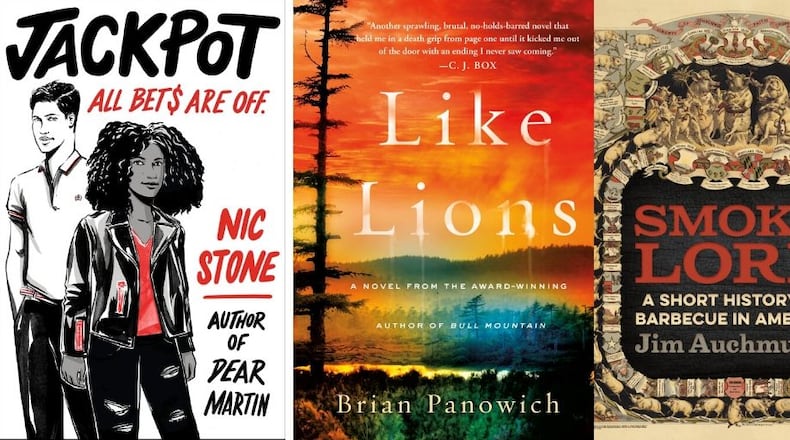The Georgia Author of the Year Awards made a bold move to elevate its prestige last year when it eliminated self-published authors from competition. The decision riled some members of the Georgia Writers Association (GWA), an organization of about 200 that has overseen the awards since 1994.
Angry complaints were posted on the GWA Facebook page, and Executive Director Jenny Sadre-Orafai, a poet and professor at Kennesaw State University, received threatening emails. Some members quit, including novelist Vickie Bley, who was prompted to start a separate awards program for self-published authors.
But as the organization prepares to announce the 2020 GAYA winners on June 13, Sadre-Orafai and board President Ann Hite remain steadfast in their decision, believing both GWA and the awards program are better for it.
“We got a lot of flak,” said Hite, a Marietta novelist whose memoir, “Roll the Stone Away,” was published by Mercer University Press on May 1. “A lot of the members were self-published. We decided just to hang in there and to restructure the writing association and the awards and see what happens. It turned out to be very successful. We had wonderful work submitted last year. I saw something I was very proud of.”
Hite and Sadre-Orafai knew some members would be displeased by the change, but they were determined to forge ahead after reviewing other distinguished literary awards that excluded self-published books. Hite pointed to the Townsend Prize, the biennial fiction award presented by the Georgia Center for the Book and the Chattahoochee Review, which awarded Xhenet Aliu the 2020 prize on May 28 for her novel "Brass." "We want to bring it up to that level," Hite said.
“To evolve as an organization, we needed to revisit the award and who was being honored,” said Sadre-Orafai, whose poetry collection “Book of Levitations,” co-written with Anne Champion, was published by Trembling Pillow Press in February. “You have to keep in mind, the award can already be self-nominated. When you have a self-nominated, self-published book, one may wonder, where is the vetting?”
Self-published books — called independent books by some — differ from traditionally published books in that the author pays the publisher to produce the book regardless of content or quality. Thanks to the internet, self-publishing has become a big industry and some authors make a good living at it. Certain genres such as romance and fantasy do especially well.
Conversely, traditionally published books undergo a rigorous vetting process, first having to stand out among hundreds of submissions to get the green light, and then enduring the scrutiny of an editor.
Hite says it is not her intent to disparage self-published books.
“I’ve seen self-published books that were beautiful books. If you do it right, it’s a wonderful thing,” she said. “But the problem is, not everyone does it right. There really wasn’t any vetting of the self-published books being submitted (to GAYA),” she said. “We got books that were spiral bound. I thought, this isn’t fair to the people sending it in, and it isn’t fair to the publishers who are sending in their authors. It was watering down the contest.”
Hite insists that self-published authors are still welcome at GWA, where they can participate in other programs, including workshops, critique groups and the Red Clay Writers Conference scheduled for Nov. 9 at Kennesaw State University.
But for Vickie Bley, a self-published author from the Athens area who writes romantic suspense under the pen name Tori Bailey, that wasn’t reason enough to stay.
“They 100 percent snubbed the indie community of authors,” said Bley.
In response, Bley dropped her GWA membership and established the Georgia Independent Author of the Year (GIAY) awards for self-published authors.
Bley was already in position to take up the mantle. In June 2018, she opened The Southern Pen Bookshop in Monroe, a store that sells books only by self-published authors, who pay for shelf space and benefit from various promotional events.
The following year, when self-published authors were eliminated from GAYA, Bley launched GIAY. Ten awards were bestowed by paid judges in five categories at an awards banquet. The nomination period for the 2020 awards will close June 15, and a banquet is planned tentatively for August, depending on social distance restrictions related to COVID-19.
Hite applauds Bley’s efforts.
“To me, that was a positive,” said Hite. “They were able to bring together a community of like-minded authors.”
Because of COVID-19, there will be no GAYA banquet this year. Winners will be announced at 10 a.m. June 13 via Facebook Live on the GWA Facebook page.
Sadre-Orafai said GAYA has traditionally received between 110 and 130 nominations every year, and that has not changed since self-published authors were dropped from the contest.
“What that means now is that we’re getting 110 to 130 nominations that are all traditionally published,” she said. “It’s more legitimate. It’s more prestigious.”
This year, 110 authors will compete in 14 categories, including biography, children’s book, cookbook, first novel, memoir, literary fiction, poetry and romance. A winner and a finalist will be chosen by a single judge in each category. Judges were selected from past GAYA winners.
Lynn Cullen, author of “The Sisters of Summit Avenue” and “Mrs. Poe,” will receive the Lifetime Achievement Award.
“She’s the most generous writer in Atlanta as far as I’m concerned,” said Hite. “She’s an amazing woman and an amazing writer. I’m writing the tribute to her. She changed the way I look at writing.”
Leon Stokesbury, who was a prize-winning poet and creative writing instructor at Georgia State University, will receive the Posthumous Lifetime Achievement Award.
For a complete list of nominees, go to authoroftheyear.org.
EVENT PREVIEW
Georgia Author of the Year Awards. 10 a.m. June 13, Facebook Live at Georgia Writers Association Facebook page. georgiawriters.org, authoroftheyear.org.
About the Author
Keep Reading
The Latest
Featured





